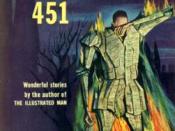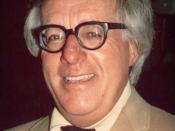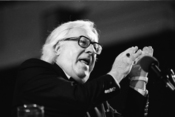In Ray BradburyÃÂs literature of Fahrenheit 451, he does not choose which sides to be on but instead he supports both of the conflicts involved. Bradbury thinks that the world with entertainment creates a life with too much exaggeration and inspiration. The mind could wander off in all different kinds of directions. With these distractions it made less time to actually concentrate on the more important things going around. While on the other side of the controversial having these kinds of ÃÂdistractionsÃÂ or ÃÂinspirationÃÂ can be very invigorating. People can find pleasure in their opened imagination. Having a broad mind can be very helpful with the world beyond. The imagery of oneÃÂs mind can expand to the fullest without being tied down or faced with consequences. Arguments wonÃÂt be as intolerant.
ÃÂCensorship is the control of information and ideas distributed or given within a society. Censorship is the practice of examining books, films, letters etc.
to remove anything that is considered to be offensive., morally harm, or politically dangerous.ÃÂ The last one hundred years of censorship was achieved by examining through works of literature, films, television, news reports, radio programs and other forms communication for the purpose of changing ideas found to be disagreeable, offensive, or harmful to the society. Ray Bradbury doesnÃÂt like to be told on how to write his literature or to revise his novels. To him he sees that as an insult to his type of writing and as hostile. His book, Fahrenheit 451, does not completely explain why books were banned and excluded from the future beyond . But it does tell us on some information on why they would be forbidden.
ÃÂ One of them had to stop burning. The sun couldnÃÂt, certainly. So it looked as if it had to be Montag and the people he had worked with until a few short hours ago. Somewhere the saving and putting away had to begin again and someone had to do the saving and keeping, one way or another, in books, in records, in peopleÃÂs heads, any way at all so long as it was safe, free from moths, silverfish, rust and dry - rot, and men with matches. the world was full of burning fall types and sizes. Now the guild of the asbestos weaver must open shop very soon.ÃÂThis is where Montag realizes that he needed to stop burning books and that he is just not burning books but also the world. That he was burning the history of what became earth today. He compares himself to the sun and time. One thing in common was that they all waste away at the world for reasons. He felt that he was manipulating people. As if he was hiding many truths from the people everywhere and that he was the bad guy, the enemy. Pressure was bought onto him and his guilt crept in.
ÃÂÃÂOne last thing,ÃÂ said Beatty. ÃÂAt least once in his career, every fireman gets an itch. What do the books say, he wonders. Oh, to scratch that itch, eh? Well Montag, take my word for it, IÃÂve had to read a few my time, to know what I was about, and the books say nothing! Nothing you can teach or believe. TheyÃÂre about nonexistent people, figments of imagination, if theyÃÂre fiction. And if theyÃÂre nonfiction. ItÃÂs worst, on professor calling another an idiot, one philosopher screaming down anotherÃÂs gullet. All of them running about, putting out the stars and extinguishing the sun. You come away lost.ÃÂÃÂThis paragraph would be considered as one of the main oneÃÂs in the whole entire book. It is this paragraph that should attract the attention of the readers to it. It highlights the BradburyÃÂs literature work. This is an opinion of another firefighter that hates books. He is pointing fingers at the chaos and debates going on around in the world. Also on different opinions from people. He considers fiction as a way to trash peopleÃÂs minds with nonsense. To fill them up with gibberish. As with nonfiction books he consider them to pointless and have no life within them. He thinks that books are junk and should be put away so to not cause any catastrophe within the human mind and world around it.
Reference: Fahrenheit 451 by Ray Bradbury





